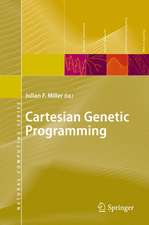Genetic Programming: 5th European Conference, EuroGP 2002, Kinsale, Ireland, April 3-5, 2002. Proceedings: Lecture Notes in Computer Science, cartea 2278
Editat de James A. Foster, Evelyne Lutton, Julian F. Miller, Conor Ryan, Andra G.B. Tezzamanzien Limba Engleză Paperback – 20 mar 2002
Din seria Lecture Notes in Computer Science
- 20%
 Preț: 1061.55 lei
Preț: 1061.55 lei - 20%
 Preț: 307.71 lei
Preț: 307.71 lei - 20%
 Preț: 438.69 lei
Preț: 438.69 lei - 20%
 Preț: 645.28 lei
Preț: 645.28 lei -
 Preț: 410.88 lei
Preț: 410.88 lei - 15%
 Preț: 580.46 lei
Preț: 580.46 lei - 17%
 Preț: 427.22 lei
Preț: 427.22 lei - 20%
 Preț: 596.46 lei
Preț: 596.46 lei -
 Preț: 381.21 lei
Preț: 381.21 lei - 20%
 Preț: 353.50 lei
Preț: 353.50 lei - 20%
 Preț: 1414.79 lei
Preț: 1414.79 lei - 20%
 Preț: 309.90 lei
Preț: 309.90 lei - 20%
 Preț: 583.40 lei
Preț: 583.40 lei - 20%
 Preț: 1075.26 lei
Preț: 1075.26 lei - 20%
 Preț: 310.26 lei
Preț: 310.26 lei - 20%
 Preț: 655.02 lei
Preț: 655.02 lei - 20%
 Preț: 580.93 lei
Preț: 580.93 lei - 20%
 Preț: 340.32 lei
Preț: 340.32 lei - 15%
 Preț: 438.59 lei
Preț: 438.59 lei - 20%
 Preț: 591.51 lei
Preț: 591.51 lei - 20%
 Preț: 649.49 lei
Preț: 649.49 lei - 20%
 Preț: 337.00 lei
Preț: 337.00 lei -
 Preț: 449.57 lei
Preț: 449.57 lei - 20%
 Preț: 607.39 lei
Preț: 607.39 lei - 20%
 Preț: 1024.44 lei
Preț: 1024.44 lei - 20%
 Preț: 579.30 lei
Preț: 579.30 lei - 20%
 Preț: 763.23 lei
Preț: 763.23 lei - 20%
 Preț: 453.32 lei
Preț: 453.32 lei - 20%
 Preț: 575.48 lei
Preț: 575.48 lei - 20%
 Preț: 585.88 lei
Preț: 585.88 lei - 20%
 Preț: 825.93 lei
Preț: 825.93 lei - 20%
 Preț: 763.23 lei
Preț: 763.23 lei - 17%
 Preț: 360.19 lei
Preț: 360.19 lei - 20%
 Preț: 1183.14 lei
Preț: 1183.14 lei - 20%
 Preț: 340.32 lei
Preț: 340.32 lei - 20%
 Preț: 504.57 lei
Preț: 504.57 lei - 20%
 Preț: 369.12 lei
Preț: 369.12 lei - 20%
 Preț: 583.40 lei
Preț: 583.40 lei - 20%
 Preț: 343.62 lei
Preț: 343.62 lei - 20%
 Preț: 350.21 lei
Preț: 350.21 lei - 20%
 Preț: 764.89 lei
Preț: 764.89 lei - 20%
 Preț: 583.40 lei
Preț: 583.40 lei -
 Preț: 389.48 lei
Preț: 389.48 lei - 20%
 Preț: 341.95 lei
Preț: 341.95 lei - 20%
 Preț: 238.01 lei
Preț: 238.01 lei - 20%
 Preț: 538.29 lei
Preț: 538.29 lei
Preț: 335.69 lei
Preț vechi: 419.61 lei
-20% Nou
Puncte Express: 504
Preț estimativ în valută:
64.24€ • 66.69$ • 53.57£
64.24€ • 66.69$ • 53.57£
Carte tipărită la comandă
Livrare economică 22 martie-05 aprilie
Preluare comenzi: 021 569.72.76
Specificații
ISBN-13: 9783540433781
ISBN-10: 3540433783
Pagini: 356
Ilustrații: XII, 340 p.
Dimensiuni: 155 x 233 x 19 mm
Greutate: 0.51 kg
Ediția:2002
Editura: Springer Berlin, Heidelberg
Colecția Springer
Seria Lecture Notes in Computer Science
Locul publicării:Berlin, Heidelberg, Germany
ISBN-10: 3540433783
Pagini: 356
Ilustrații: XII, 340 p.
Dimensiuni: 155 x 233 x 19 mm
Greutate: 0.51 kg
Ediția:2002
Editura: Springer Berlin, Heidelberg
Colecția Springer
Seria Lecture Notes in Computer Science
Locul publicării:Berlin, Heidelberg, Germany
Public țintă
ResearchCuprins
Talks.- A Pipelined Hardware Implementation of Genetic Programming Using FPGAs and Handel-C.- Finding Needles in Haystacks Is Not Hard with Neutrality.- Routine Duplication of Post-2000 Patented Inventions by Means of Genetic Programming.- Explicit Control of Diversity and Effective Variation Distance in Linear Genetic Programming.- Discovery of the Boolean Functions to the Best Density-Classification Rules Using Gene Expression Programming.- Combining Decision Trees and Neural Networks for Drug Discovery.- Evolving Fuzzy Decision Trees with Genetic Programming and Clustering.- Linear-Graph GP - A New GP Structure.- Parallel Surface Reconstruction.- Evolving Classifiers to Model the Relationship between Strategy and Corporate Performance Using Grammatical Evolution.- A New View on Symbolic Regression.- Grammatical Evolution Rules: The Mod and the Bucket Rule.- No Coercion and No Prohibition, a Position Independent Encoding Scheme for Evolutionary Algorithms – The Chorus System.- Exons and Code Growth in Genetic Programming.- Uniform Subtree Mutation.- Maintaining the Diversity of Genetic Programs.- N-Version Genetic Programming via Fault Masking.- An Analysis of Koza’s Computational Effort Statistic for Genetic Programming.- Posters.- Genetic Control Applied to Asset Managements.- Evolutionary Algorithm Approach to Bilateral Negotiations.- Allele Diffusion in Linear Genetic Programming and Variable-Length Genetic Algorithms with Subtree Crossover.- Some Experimental Results with Tree Adjunct Grammar Guided Genetic Programming.- A Puzzle to Challenge Genetic Programming.- Transformation of Equational Specification by Means of Genetic Programming.- Automatic Generation of Control Programs for Walking Robots Using Genetic Programming.- An Investigation into the Use ofDifferent Search Strategies with Grammatical Evolution.- Genetic Algorithms Using Grammatical Evolution.- A Brute-Force Approac to Automatic Induction of Machine Code on CISC Architectures.- Deriving Genetic Programming Fitness Properties by Static Analysis.- New Results on Fuzzy Regression by Using Genetic Programming.- Coevolution Produces an Arms Race among Virtual Plants.- Comparing Synchronous and Asynchronous Parallel and Distributed Genetic Programming Models.
Caracteristici
Includes supplementary material: sn.pub/extras

























